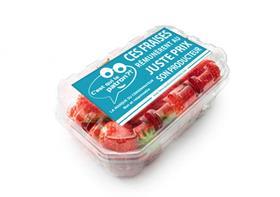
Consumer brand ‘C’est qui le patron?’ (or ‘Who’s the boss?’), launched in 2016 by French waste pressure group Gueules Cassées in response to farmers’ struggles with low milk prices, has given the public a first glimpse of its strawberries as it expands into new products.
The brand is the first true consumer label, according to founder Nicolas Chabanne, since it consults with consumers online to come up with the requirements for the product, including a fair return for the producer.
'Each product is imagined, created and chosen, in terms of its requirements, by the consumers themselves,' he told media start-up Brut.
The aim, he explained, was to create a collection of products that were sustainable, fair and responsibly produced, including a commitment to healthy and local food and a no-GM guarantee.
Thanks to its success, the brand has expanded to include not just milk but juices, pizzas and meat, with strawberries coming this spring and other fruit including apricots and cherries apparently in the pipeline.
“When we started with milk, we had so many calls from producers of fruit and vegetables explaining that they faced the same problems,” revealed Chabanne in an interview on Numéro 23.
On its Facebook page, the company included an image of a plastic container of strawberries bearing its 'C'est qui le patron?' label, including the words 'Ces fraises rémunèrent au juste prix son producteur' ('These strawberries guarantee a fair price for the producer').
However, it stressed the importance of consultation with consumers before its strawberries were harvested in the spring, including on the choice of packaging.
“Of course, we will decide everything, origin of fruit, type of crop, fruit varieties, type of harvest, frequency, seasonality, guaranteed sugar, compensation of producers and packaging,” a recent Facebook post stated.
“There is a pleasure to be had from this product that goes beyond its taste and quality,” explained Chabanne. “It is the knowledge that your money is being used to feed a system that is not going to destroy small producers and will favour the environment.”



